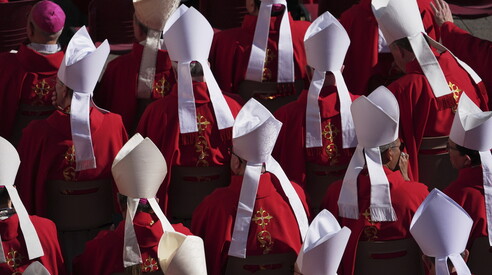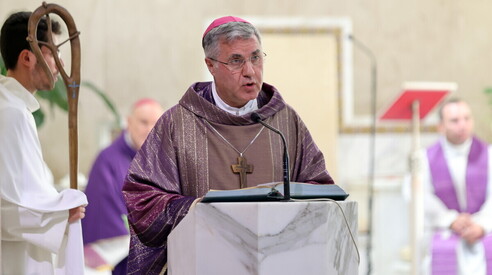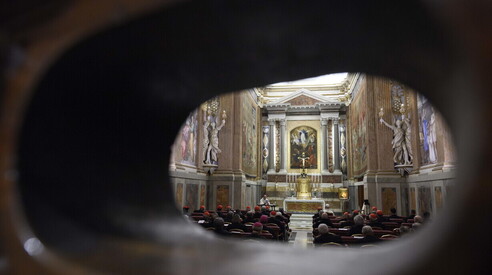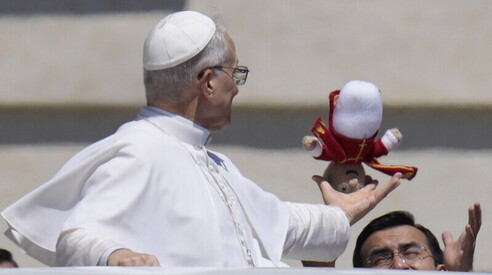
LaPresse
english version
Bergoglian favorites, a category so numerous it barely exists
The conclave, it is said, is in the hands of the cardinals created by Francis. They do make up the majority, but they are divided
This article was originally written in italian and can be read here. The english version is translated by artificial intelligence.
The Conclave will begin on May 7. In the morning, the Mass Pro Eligendo Pontifice; in the afternoon, entry into the Sistine Chapel. Among the flood of statements made by cardinals in recent days—as they rush between general congregations, funerals, or the novendiales (few, in truth)—the word heard most often is “unity.” It’s always said after a pope’s death, when the cardinals’ public hopes—at least those voiced to journalists and media—emphasize the holy atmosphere of these meetings that will lead to the Conclave. There are differences, they say, but a compromise will be found. Since yesterday, with Francis buried in Santa Maria Maggiore, this search has begun—and it’s proving anything but easy.
The College of Cardinals has seen many new members over the past twelve years, and never in history have there been so many electors. More than that: many of them have only come to Rome to receive the red hat—and maybe a handful of other times. They are far from the centers of power, unfamiliar with the daily dynamics of the curia, unaware of who their brother cardinals are, those with whom they’ll be sharing this momentous choice. In a short video the other day summarizing the congregations, one cardinal could be seen asking his seatmate: “Is this your first Conclave?” Just to give you an idea.
With emotions over the Pope’s death starting to fade, and after the usual, excessive flood of sweet praise for the departed pontiff (no surprise there), and with the teenagers who tell newspapers they “want another Bergoglio” now back home—just as their parents once said they wanted another Wojtyła—the situation facing the cardinals is anything but simple.
It’s a fact that the Church is divided: it always has been. Just read the Acts of the Apostles to see that. The factions have changed over the centuries—zealots versus moderates; French versus Austrians; Spanish cardinals; Italians playing mediators, themselves split between the political and the spiritual. After the Council, the divide was between progressives and conservatives, which evolved into a clash between liberals and traditionalists. These categories are ultimately superficial, especially when it comes to the so-called "Bergoglians"—a group so vague it's hard to even define.
From the start of his pontificate, Francis made clear that his program was to launch the boat and let it sail without a fixed destination. Total trust in divine mercy, which would guide it even through storms. So came reforms and half-revolutions, historic leaps forward followed by sudden halts. Yes to the Synod on Synodality with women, laypeople, and former anti-globalists-turned-believers: open discussion, parresia, free debate. Except then all the most divisive topics were removed from the agenda and handed over to commissions for further study, destined often to be shelved.
He wrote in the Evangelii Gaudium—the magna carta of his pontificate and likely its least-read document—that doctrinal authority should be given to national episcopal conferences. Some took him at his word, like the Germans, who launched their Synodaler Weg intending to overturn the Church’s hierarchical pyramid and ensure continued revenue from the Kirchensteuer, the church tax on baptized members, with a makeover promising lay leadership, female celebrants, and optional celibacy.
When the Pope read the plan crafted on the banks of the Rhine, he called the Germans to order, sent curial heavyweights to reprimand them, and said in an interview that what was happening in Frankfurt was “not very Catholic.” So should the boat continue sailing like this, or would it be better to at least give it a compass?
Not a few cardinals, even among Bergoglio’s sincere supporters, are thinking just that. They want a pope who continues the 2013 agenda—but with more structure and institutional clarity. Reform, yes, but with caution. As one cardinal (not part of the nostalgic opposition) whispered, you can't authorize the Doctrine of the Faith to say no to blessing gay couples, and then apologize the next week after the Angelus. Father Antonio Spadaro, author of the most important interview of the pontificate—the one where the Church was called a “field hospital”—once said that two plus two could also make five.
Others, less fond of such math, stressed that between black and white lies gray—the shade that breaks the rigidity of monochrome thinking. But do the cardinals still want to color the Church in gray? Are they still convinced that two plus two can make five?
For years—especially after the last consistory—people have said that the “Bergoglians” have won an absolute majority in the College of Cardinals. Bergoglians, meaning created by Francis, and therefore, so the story goes, aligned with his views. They are many—over a hundred of the 134 or 135 electors, about 80%. If it were that simple, the new Pope would be elected in the first vote.
But the so-called "Bergoglians" are a diverse bunch: while they were all created by Francis, each has his own priorities and pastoral experience rooted in vastly different social and geographic contexts. Let’s take some themes of Francis’ pontificate: once inside the Sistine Chapel, will the “Bergoglian” vote for someone focused on existential peripheries? Maybe their priority is ordaining viri probati. Or perhaps they care most about interreligious dialogue. Or popular piety?
Are they Bergoglian in the sense of “Todos, todos, todos” and “Who am I to judge?” or Bergoglian in the sense that gender theory is a “mistake of the human mind”? Bergoglian who considers Emma Bonino among Italy’s greats, or Bergoglian who calls abortion advocates “hitmen”? The matter is complex and therefore unpredictable.
The name on everyone’s lips as a potential mediator is Cardinal Pietro Parolin, the gentle Secretary of State who has served Francis since 2013. A negotiator, he worked to temper the Pope’s many impulses, which often bypassed the Secretariat of State through personal missions or trusted emissaries. A stern Venetian and career diplomat—he was nuncio in Caracas when recalled to replace Bertone—he is seen as the calm continuation of the Bergoglian era, but with more clarity and fewer impulsive outbursts. Still, not all progressives are enthusiastic. It’s more telling to read between the lines than to listen to soundbites—like when Cardinal Reinhard Marx said what’s needed is someone “communicative.” Not exactly Parolin’s portrait.
Parolin enters the Conclave as a favorite, presiding over it since Dean Cardinal Re will not participate, having long surpassed the age limit. Skeptics note his lack of pastoral experience—his entire career has been in the Curia or diplomacy—and that almost never in history has a sitting Secretary of State been elected Pope. The last was Eugenio Pacelli—different era, different context.
And if synodality, the dominant theme of the final phase of Francis’ pontificate, were to take center stage in the voting? Then Cardinal Mario Grech of Malta might be a serious candidate: papabile age (68), European but from the periphery, curial but with diocesan experience.
All of this, however, only scratches the surface. It doesn’t consider the inner workings or what’s on the minds of cardinals who don’t know one another, whose views and visions for the Church of tomorrow remain unknown. Even the “progressive” camp—the so-called Bergoglians—is far from unified. It's a matter of different sensibilities, with priorities not always aligned. The general congregations this week will help bring some clarity. Yet Cardinal Anders Arborelius—one of those names that might emerge in a deadlock—foresees a “long Conclave because we don’t know each other.”
In any case, it seems the so-called “conservatives” are excluded from the game, being numerically far less influential. But in the event of multiple rounds of voting, they could return with compromise proposals. It’s still too early to say—even to gauge the fallout from the “Becciu drama” of recent days. How did cardinals from the ends of the earth react to the Sardinian prelate being informally asked by curial officials to stay out of the Sistine Chapel?






